Text
Thank you Aizawa!
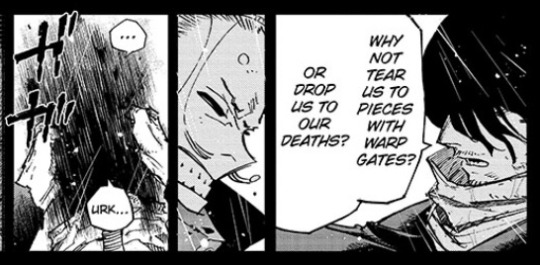
Kaminari (a student) assumes Kurogiri was saving them but Mandalay (adult pro hero) is much more cynical
The readers know what’s going on but they don’t, so this is more of a reflection of their worldview than anything

Don’t know if this needs to be said, but Mandalay is wrong. Erasure would’ve been removed anyway if Aizawa fell to death, and Mic being saved had nothing to do with erasure. This was 100% Shirakumo saving his friends
524 notes
·
View notes
Text
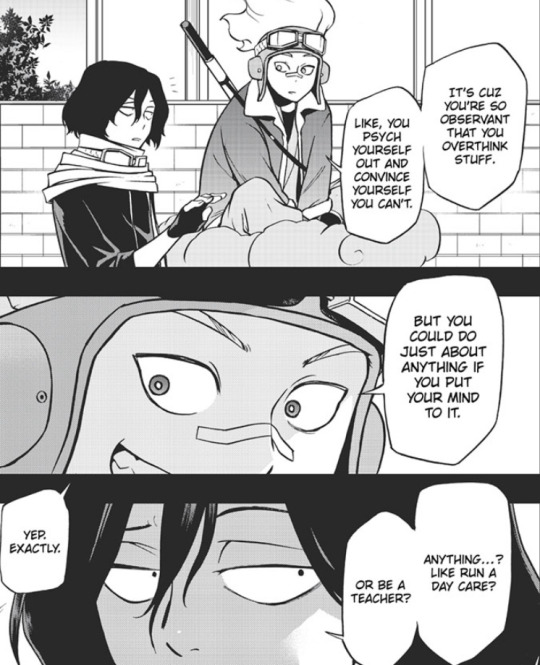
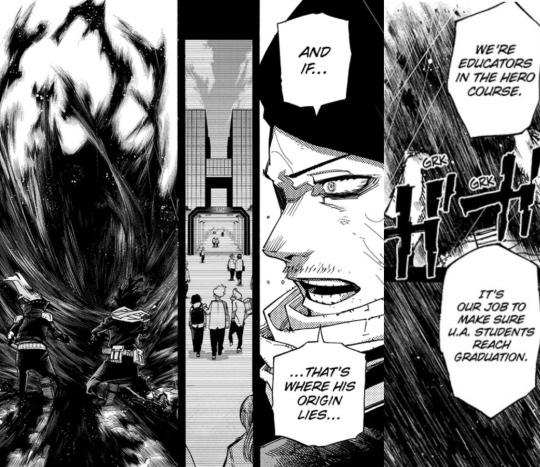
87 notes
·
View notes
Text
My favorite thing about nomu Aizawa x Kurogiri is that like.. okay getting into My Brain I imagine that Ujiko tries everything in his goddamn power to make them forget each other and keeps them away because Remembering Could Pose A Problem, but my god. Ujiko is starting to believe in soulmates (derogatory). He just absolutely cannot keep them away from each other. Eventually AFO with all his charm and wit is like My Dear Friend.. Perhaps It’s Not That Big Of A Problem. So he’s able to manipulate them with their relationship with stuff like The Idiot Heroes Would Separate You In Tartarus Forever and stuff like that. That just got really sad sorry. At least Tomura has two weird babysitters instead of one
14 notes
·
View notes
Text
Personal opinion poll (for now) ✌️ Bit of a brain twister but I’m curious! I feel like this can really tell how you interpret his overall character. Try to vote even if you don’t care about him, I want opinions from all sorts of people!
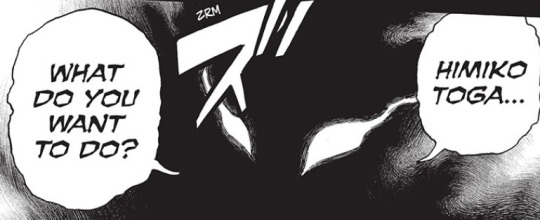
10 notes
·
View notes
Note
I need help writing the league of villains for a fan fiction. Like can you give me tips on to write their dialogue and stuff like that
Thanks for the ask! Here are some things that I think would be helpful, but please be aware that it's my approach to writing the League the way I interpret them. I'm sure there's people who finds my fic wildly inaccurate in terms of characterization. Sometimes I go back months later and disagree with my own stuff, given new information or outlook. You'll have different interpretations than me, and that's okay. And thus,
Tip #1: First of all, it’s fanfic, it’s fun, and it’s yours. You can do whatever the heck you want! It does not matter at all what you do with the characters, their dialogue, their personalities, their relationships, etc. I’ve read plenty of AU fanfics where I could not recognize Shigaraki Tomura/Shimura Tenko, despite the character having the name, but I still liked the story okay. Really, it’s all up to you and what you want.
That said, to actually answer your question:
Tip #2: Re-read the manga. Read the scanlations - multiple versions from different scanlation groups. Read the official. No version will be perfect, some are better than others (Viz Official has its issues, but it is done by a professional translator and I tend towards it; Fallen Angels (Chapters 1-150s) was the first to scanlate and iirc they even included translation commentary at the end of their chapters; I found mangastream to be more accurate than Jaimini (Chapters 150-250s)), but having a variety of translations will give you insight into the intention of a dialogue, and different ways of achieving it. Read the original Japanese, if you can.
Tip #2.5: Best way to figure a character, I find, is to describe the panels they’re in as if you’re writing a very plain, objective, impartial image description. Now you have an overview of their outward behavior, their actions, their dialogue. Using that, you have the basis for developing their motivations and personality. It’s the difference between ‘Shigaraki used gamer lingo a few times here, so he is a gamer... therefore he’s obsessed with games and that’s all he does’ and ‘In the first 100 chapters of the story, despite speaking sometimes like a gamer, Shigaraki is actually seen reading newspapers rather than holding a game console’.
Put another way, don’t assume generalized descriptions or traits for a character and write them based on that. You risk writing a trope or archetype or situation rather than the actual character.
When a loved one dies suddenly, people will be in shock, before sobbing and weeping uncontrollably. That’s generally true, but the character may manifest grief in a different way. Someone close to Toga is killed - what does she do? You can write her breaking down crying, that’s perfectly reasonable. But if you look at the manga, when Twice is killed, she doesn’t cry right away. She gets angry; she lashes out. She’s deeply hurt by his murder, of course! But the tears she sheds for his passing are few in the immediate aftermath - her grief mostly takes the form of slicing Heroes’ throats.
Tip #3: Read everything else, for inspiration, for background knowledge, for tone, for your own gain outside of fandom.
Just the other day, I read Real, the wheelchair basketball manga by Inoue Takehiko. Its three main characters are marginalized by proper society - two because they’re disabled, one because he’s a high school dropout - and there were moments where I was reminded of the League’s situation. In the first chapter, the high school dropout makes a final visit to school where his teachers didn’t think much of him, and his classmates looked down on him. As he leaves, he thinks to himself that everything he does ends in failure and he’s an idiot, all the while he takes a dump at the school gates as a parting gift.
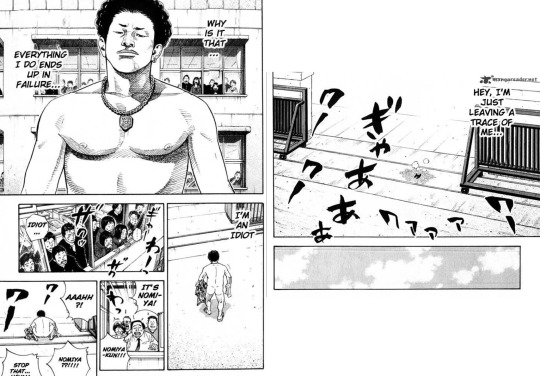
While I can’t see anyone from the League doing that exactly shot for shot, the spirit of it - being seen as a fuck up, being unwanted, being defiant in face of that, even in a inadvisable way - is similar.
Tip #3.5: Another book I’ve read years ago is Codes of the Underworld: How Criminal Communicate. It was very informative, and I think back to it sometimes when I write for the League.
Criminals face severe constraints on communication imposed by the action of the law, and, unlike the rest of us, cannot easily develop institutions aimed at circumventing them. This central feature of criminal lives makes communication and above all reliable communication exceptionally hard to sustain. For instance, the same secrecy that protects criminals from the law hinders their opportunities to advertise their goods and qualities… In the underworld, moreover, punishments for mistakes and irrational behavior are harsher than they are elsewhere. In the world of regular business, failures of communication can lead to a loss of business, but in the underworld they can result in years behind bars, or worse.
I don’t follow it exactly, because the League is in a children’s fantasy story, and maybe this was obvious but now that it was written out to me, I know how to give the Villains an “edge” to them that a non-Villain might not have, because as Villains, they do often logically would to be secretive and brutal and cautious. Dabi walking around in broad daylight meant their hideout was discovered and All Might literally took down the wall to the bar; a breakdown in negotiations with Overhaul meant Magne dying and Compress getting his arm blown off.
Tip #4: Related, let the League be assholes, because sometimes they are. Let them be mean and cruel and problematic. Sometimes they’ll be jerks to each other. Nearly all of them grew up in bad circumstances where they probably were not taught important lessons and details about respect and boundaries and being nice. They are definitely not going to be aware of the intricacies of fandom's (oft-American and oft-terminally-online) consensus about problematic behavior. And that’s fine.
I remember once receiving an ask about why Shigaraki would pull Twice’s mask off in Chapter 224. Wasn’t that terrible of Shigaraki? Yeah, it was. It was also the quickest, most efficient way to get Twice to quit his arguing with the rest of the League, so Shigaraki can announce that they are going to rescue Giran (what Twice was arguing for). After that, he puts the mask back on for Twice. If you ask me, I’d say Shigaraki thinks this evens out - he does something mean that he knows will freak out Twice for a moment, but it’s because he’s arguing for Twice’s side, and he’s putting on the mask back at the end.
You and I would likely never do something like that because we know taking away someone’s important assistive aid, even for a moment, hurts them and we don’t want to cause them pain for even a second if we could help it/there’s not ‘evening it out’/it demonstrates a power unbalance that perpetuates ableism/there are other ways to stop someone and grab attention/we know not to touch someone even the slightest without permission/etc. But does the character you’re writing know all this? Does he care? Does he think it’s worth following these rules? Does he have time for it, does he have incentives for it, does he have the lucidity, does he think he’s an exception because of this and that, etc, etc.
A lot of things, most people often just don’t know until they’re taught to be specifically aware. As an example: When I was younger, I knew broadly that thinking things without permission was bad; but what if I took these pair of scissors from my friend’s desk and used it and put it back before the owner knew? The owner is my friend. They once told me it was okay to take it, so it counts even today, right? It was just a pair of scissors, a common household item. My friend did not care; still does not care. But knowing what I do now about things like violations of boundaries, explicit consent, the continuation of these concepts for the most trivial and mundane things even in the deepest of friendship or familial ties - I feel the need to ask to use something. That’s me and what I’ve learned through the years, though. It’s probably not going to be [fictional character].
And sometimes the League are just bad people. Shigaraki tried to kill Toga and Dabi at their first meeting. Mr. Compress is seemingly a-okay with kidnapping and murder despite his ancestor being more of a Robin Hood type. Spinner likely knowingly doomed his family to even worse ostracism and harassment from his fantasy-racist hometown when he ran off to join a group of well-televised terrorists.
That’s also fine. They’re not real. They’re fictional Villains, and you’re temporarily using them as hand-puppets to tell a story.
Tip #5. For dialogue, it helps knowing what each character’s voice/speaking style sounds like. Some basics:
Shigaraki:
“Shigaraki speaks with the normal masculine contracted speech, but with a sinister tone. Surprisingly not very cussy. He likes aggravating other people though.”
Caleb Cook notes that Shigaraki talks like an overgrown kid. (In comparison to ReDestro, who “uses more SAT words, since he’s had a formal education.”)
He can be a sarcastic smartass.
Kurogiri:
“Kurogiri is Extremely Polite”
He only refers to Shigaraki as ‘Shigaraki Tomura’. Always the full name, always just that.
He speaks very formally and respectfully; however, there is also a nastier side to him that comes out when he faces off Heroes: Saying to All Might, “I can't say I like the idea of having blood and guts inside my gate, but… if they're yours, I’ll happily oblige.” (Chapter 18); mocking Eraserhead and Mic when they're being sad over him, “Have you mistaken this place for a confessional of some kind?” (Chapter 254)
Dabi:
“Dabi is like Shoto but ruder, though not to Bakugo’s extent”
He calls people names: Toga most often, as 'crazy'; he called Spinner 'lizard' once; when he first met Shigaraki, he said 'gross'.
Note that all the examples above are people younger than him; as far as I know, Dabi refrains from name-calling his allies who are older than him: Compress, Twice, Skeptic.
He inexplicably politely calls Ujiko ‘Ujiko-san’.
Compress:
“Compress is kind of like Sero. He’s got that trickster tone to him. Gets rougher when things don’t go his way.”
Likes to call himself an ‘old man’ at age 32; talks like an older gentleman as well.
Twice:
Twice contradicts himself a lot. Generally, he says one thing, his alter then says the opposite of that immediately afterwards.
However, when things are urgent or serious, his alter’s speech fades. See Chapter 148, when he confronts Shigaraki about the Overhaul plan - he spills out his feelings with no contradiction. See Chapter 224, after they find out Giran’s been kidnapped - when arguing with the League about whether to say Giran, he’s completely coherent.
Twice argues back with the alter sometimes, rather than the alter simply blurting out the opposite of what he says.
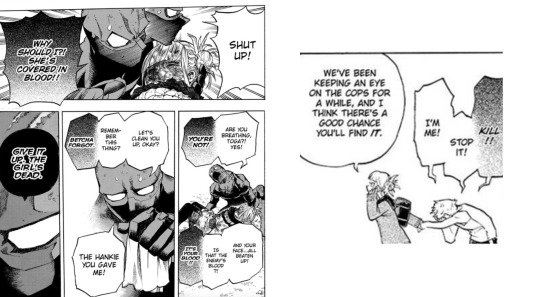
After he gets over his clone trauma, the alter seemed to have…integrated into himself? He still speaks in contradictions, but less so, and it doesn’t seem to be a separate voice speaking out involuntarily
Spinner:
“Spinner also speaks the normal masculine contracted speech like Kirishima and Kaminari, but he talks like Tokoyami during the Forest Lodge arc because he’s a Stain chuuni.”
An average, normal guy, compared to the rest of the League: not very polite, but not particularly rude; no great wit or affect (after he stops being a Stain fanboy), but not unintelligible; game references infrequently.
Giran:
“Giran is also like speaks the normal masculine contracted speech similar to Shoto, but he’s a lot more mature.”
He calls Shigaraki “Shigaraki-san”, being polite towards him as a customer.
He calls Twice by his last name, ‘Bubaigawara’, likely because they seem to be friends beyond just business.
Toga:
Toga is a generally polite girl, talks like a teenager.
She can be bad at explaining herself! Seems to forget the people are lacking context for the things she says. “Hey, my best friend Jin just got killed by a Hero, which makes me sad, as well as worried that I'm going to be cut down like nothing as well, especially because I've been told how abnormal I am, even though I think I'm a normal person just like you, because I have emotions like love and fear, as any regular human does, and that lifetime of repression has hurt me.” -> Whatever she actually says to Uraraka in Chapter 289.
Only Toga uses first names with honorifics with the other League members. This is her being cute and desiring familiarity, but still polite.
◦ Twice is ‘Jin-kun’
◦ Shigaraki is ‘Tomura-kun’
◦ Dabi is, at first ‘Dabi-kun’; after she finds out he’s Touya, he’s ‘Touya-kun’
◦ Spinner is ‘Spinner-kun’
◦ However, Mr. Compress is simply ‘Mister’
Conversely, only Mr. Compress and Twice call her ‘Toga-chan’. All the 20-somethings dudes call her just ‘Toga’.
*Note what the League calls each other. They all call each other using Villain names. If the male members of the League are using first names and honorifics for each other, they’ve either gotten extremely close and intimate and weirdly polite, or they’re being possessed by AFO.
Tip #5.5. Instead of fretting over writing good dialogue right away, just write whatever you need to get a scene over with. You can go back later to change the tone and speaking style of the sentence.
Here’s a line I had for Dabi at first:
“Whatever hospital he works at should be shut down for incompetency in background checks.”
Wayyy too formal. Here’s the line after I went back and fixed it:
“Whatever hospital he works at should be shut down for being shit at background checks.”
Still not my best shot, but better. Sometimes all you need is just to change a word.
Tip #6. Humor. The League is ridiculous and hilarious. Always try to have fun with their interactions and antics.
66 notes
·
View notes
Text
I have a personal headcanon that post-canon Kurogiri works with small children. Even if it doesn’t happen, I just love the idea. He’s great with children, he died for children, his birthday (5/5) is children’s day, HIM WITH CHILDREN!!
Just look at this. More, please
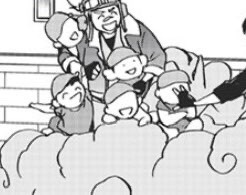
#mha#bnha#kurogiri#oboro shirakumo#we don’t know how old Tomura was when they met so honorary mention of ‘Kurogiri’s been babying you for too long’#born to be a preschool teacher. forced into whatever the fuck nightmare plot line he’s in.
32 notes
·
View notes
Text
I want to jump on this topic of Shirakumo being more of a prop than a person, because it’s pretty strange for an MHA character that’s attached to multiple plots. He really is completely defined by his relationships with others, there to pull other characters along. And Kurogiri is barely his own person too; a walking quirk, Aizawa and Mic’s dead friend, Shigaraki’s guide, AFO’s pawn. In the final war, he’s been nothing but a tool. To make things worse, it’s implied that most of his current personality is a result of either brainwashing or mental alterations.
He’s unusually shallow for a frequently recurring MHA character. No thoughts, head empty, only other people. The extent of his complexity is wondering who he’s meant to be, because not even he knows who he is.
But if that’s all on purpose, it’s honestly pretty fantastic storytelling, and if its not on purpose then its still pretty cool, because AFO’s primary form of abuse is dehumanization. The nomu, especially, are not seen as people by the heroes until very recently. Since Kurogiri will likely be the centerpiece of the inevitable nomu lore dump (Horikoshi promised he’d spell out all the details of them), his character is undeniably tied to that same dehumanization. Let’s not forget that Shirakumo’s death was related to how heroes don’t see themselves as people that need protection too.
It also ties into Horikoshi’s comments on how he thought of this story by reminiscing on how used to see teachers as nothing more than teachers. The obvious connection is the other two, and Aizawa and Mic were given more depth thanks to Shirakumo, but Kurogiri definitely had a “teacher” role, too.


We’ve already seen the fragmented start of Kurogiri introspection. I’m hoping we’ll be getting a lot more of it because it’s sorely needed for his character to work.
78 notes
·
View notes
Note
I still don’t understand AFO. Why is he like this. This series repeatedly goes out of it’s way to humanize the villains but AFO is still just evil because he wants to be the demon lord and I don’t get it.
That would be the point, I feel-- AFO doesn't want to be understood or seen as "human." He wants to completely lose himself in character, wants other people to mindlessly play along with the story he's written for himself like good little extras, and wants everyone around him to acknowledge what a ~perfectly inhuman demon lord~ he is-- and he's bent the entire narrative of MHA around himself like a shield in order to accomplish that. Like, the idea of people breaking the same black and white narrative that he's been using to protect himself (and trap others) quite literally drives him insane:
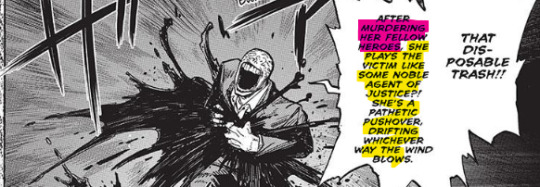
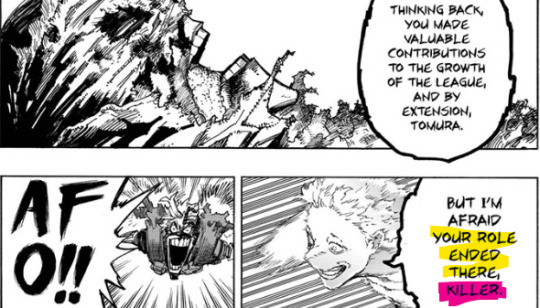
"That murderer--" "You killer--" oooooo you're so mad that human nature is basically good, that people are endlessly capable of growth and healing, and that actual human beings can't simply be shoved into teeny black and white fictional boxes ooooo
all the more evidence that he's gonna completely lose his shit when Tomura ultimately refuses to kill Izuku lmao
I wanna point out his speech bubbles in the second image, bc Hori frequently uses speech bubbles to emphasize a character's mental state-- Like.... Bro is literally coming apart at the seams with rage that Stain is trying to be anything more than a starter villain. 😭The english translation also kind of sort of makes it seem like AFO is simply referring to Stain by his moniker (Hero Killer), but the term he uses in the original text feels a little more... loaded, imho?? The kanji used for Stain's "Hero Killer" Moniker is "Goroshi" ("殺ごろし"), but here, AFO instead refers to him as a "Murderer" (殺人犯/satsujin-han). Calling Stain an out-and-out murderer instead of calling him by a villain moniker feels a lot more specific, a lot more pointed, and it also tells us a lot more about AFO’s fucked up sense of values.
Anyway, I've said this before, but AFO is a character who reads heavily as an escapist fantasy gone horrifically wrong. "Why is a world where villains are allowed to climb back up from rock bottom and heal so intolerable to AFO?" "why does the idea of people breaking free from their roles make AFO so angry?" "why is AFO literally trying to BECOME a comic book character?" are better questions to ask than "why is bro just evil for the sake of it," I feel. Like obviously, a world where the label of "villain" gets thoroughly and utterly dismantled is one where AFO loses his power over others.... but it's also a world that rips that protective layer of "fiction" away from him, exposes his own humanity, and destroys that delusion of becoming the "perfect villain king" that he's wrapped himself up in.
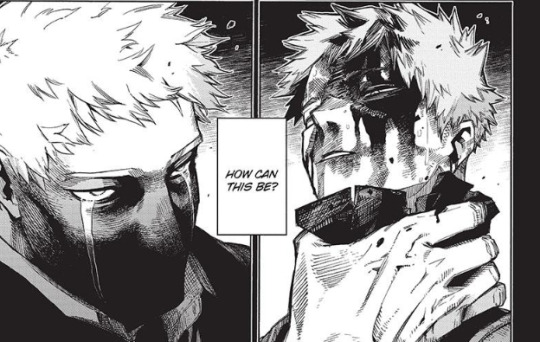
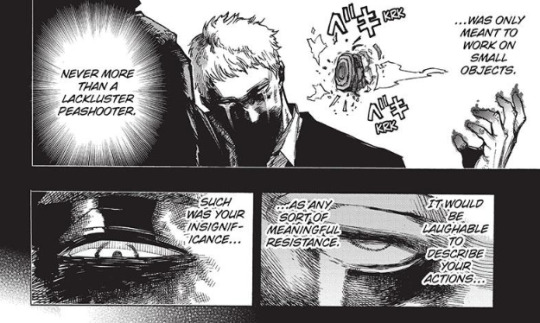
tfw you LARP so hard that it ends up getting your brother killed and now breaking character means you gotta Process All Of That
.................................................... Unless...? :)
What I find especially interesting about AFO is that MHA's narrative actually cooperates with shielding him from the readers, to a degree-- scenes that depict rare moments of genuine emotion are overlaid with contrary, cartoonishly evil narration that's meant to distract the reader from what's actually being depicted. The bulk of the series depicts his face being hidden in shadows even though it *literally* has no reason to be, and we don't get an unobscured look until the other characters finally start rallying together to reject his story. He is literally introduced to the series through a TV screen, which MHA has been using as a shorthand for its depiction of fantasy since day one:
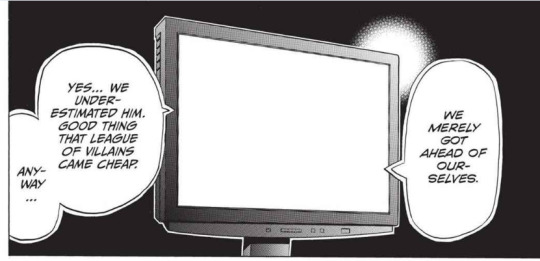
In my opinion, I feel the final act of "rejection" that AFO fears isn't from his brother, or his followers, or "his other self"-- what he fears is the story itself rejecting him and finally exposing him for what he is: an utterly mundane human. Like, a total freak of a guy to be sure, but still totally human. The narrative revoking its various "protections" and working against AFO to humanize him acts as the final insult to everything he claims to believe in while doubling as the last bit of confirmation that he was never gonna become a "perfect demon lord." MHA being what it is, this is something inevitable.
Where other characters in this series draw strength from their origin-- the moment that defines them as a human and individual-- AFO likely fears and rejects his own origin for this same reason.
Anyway. I would describe AFO as a wannabe-author who refuses to make public appearances or divulge details about his personal life, but ultimately reveals a little too much about himself through the "stories" and "characters" he tries to write-- so ppl still know he's a freak with issues by virtue of how fatherless his content is. ¯\_(ツ)_/¯ Putting together all the pieces of himself that AFO accidentally lets slip is part of what makes MHA so fun (to me, at least!).
286 notes
·
View notes
Text
Shigaraki and Kurogiri as brothers
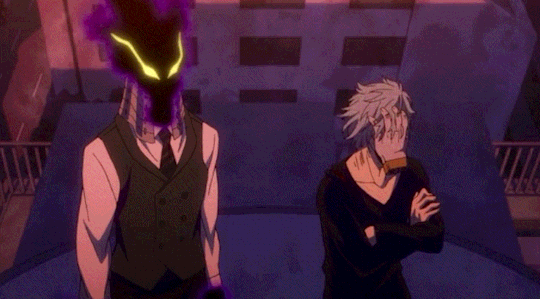
Not biological, of course. Anyway, I wanted to bring this headcanon outside of twitter. I usually flinch at unnecessary applications of familial terms (I’ve admittedly never liked dadgiri) but I do feel like there's a stronger case for this one, especially with it’s darker tones related to AFO’s cultish “family” of victims. So, I wanted to share my thoughts.
This first point is more of a simple one. Shigaraki and Kurogiri are both AFO’s “students”. It gets lost in translation since it all gets coined as “master”, but they are the only two recurring characters who refer to him as “sensei” (teacher/professor/master)- Machia refers to AFO as “Shū” (lord/head of the house/master).
And, well, AFO definitely raised Shigaraki. Kurogiri ominously says that “Shigaraki isn’t the only one he raised/molded/groomed” when referring to Machia, and he follows it up with “meet another one of AFO’s loyal servants”. Kurogiri tends to be put into panels that have double meanings and it’s very easy to make the connection that he could be talking about himself, too.
There's the third point that there's a strong theme of a cult-like family in the children that are orphaned/kidnapped by AFO and Garaki. AFO explicitly refers to "raising" Touya and being part of a family (of future Nomu).

On top of all of this, you have to look at their ages. Kurogiri has been raised by AFO from as young as 17. Bakugo and Toga are currently 17, if that helps with perspective. An older kid, but still impressionable. Maybe not always happy with all the lessons and dress-up, but he didn’t have the ability to leave. He was brought in at around the same time as Shigaraki, and their age gap is around 10-11 years.
So, here’s the logic. Kurogiri and Shigaraki were kidnapped around the same time, they were both kids, and they were both groomed-raised by the same man during the same time period. They view AFO with a similar reverence. He’s their sensei. Kurogiri doesn’t have any more ability to fight AFO’s will than Shigaraki does, even if he knows more.
So, rather than Kurogiri being a "dad", AFO is the "dad" to the two of them while Kurogiri is more of an "older brother" that's made to babysit Shigaraki (canonically, 'babysitter' is the only concrete term used to describe Kurogiri's role).
More discussion under the cut:
Once you realize they can be read as brothers, a lot of their interactions suddenly takes a more lighthearted tilt to it and a lot of things click in place.
I want to take a moment to debunk some interpretations I’ve seen that Shigaraki treats Kurogiri horribly or something, that it’s this awful abusive power dynamic. For one, Kurogiri can, in fact, say “no” to Shigaraki and his whims. He can’t say no to AFO assigning him as his protector, but this is a job that he genuinely doesn’t seem to mind.
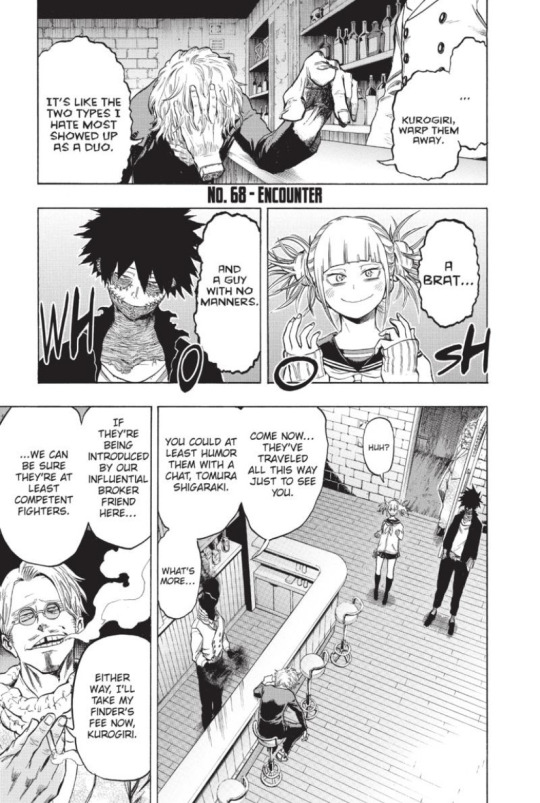
The reason he does most of what Shigaraki says is that he, according to Ujiko, babies him like hell. 254 is the hammer on the nail that Oboro just genuinely likes and cares about Shigaraki, with his care for him being the very reason that Aizawa is able to recognize him under the mist. I’d even argue that the reason that Shigaraki’s voice is on the tape recorder is because AFO knew that Kurogiri would move regardless of mind control.
And, if you really look at the way Shigaraki talks to him, if you read him as a little brother, suddenly all the “idiot”s make a lot more sense. I’ve never quite placed how it’s intended to read but now it’s clear it’s “ugh, my stupid idiot babysitter who can’t read my mind”. It’s a very, dare I say, sibling thing to do!!
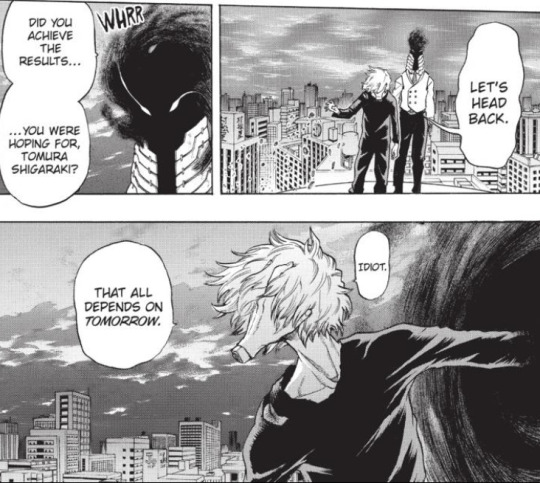
And Shigaraki cares in return. He’s clingy at heart. When it’s all over, I can’t imagine either of them would carry much or any resentment. Unfortunately, they weren’t able to have a proper reunion yet, but I’d be shocked if they didn’t.

That’s not to erase the complexity of their relationship that comes with the two of them being under AFO’s thumb, though. There’s plenty of other meta about how Shigaraki is abused by AFO (and it should be obvious how Kurogiri is controlled) so it doesn’t bear repeating here.
Kurogiri aids AFO’s plans and Shigaraki takes advantage of Kurogiri’s mind-controlled service, but at the same time, Kurogiri physically can’t dissent and Shigaraki is likely left in the dark about everything. For the two of them, there’s an underlying sense that they can’t save each other.
They can care, but not too much, and they can’t cling or protect respectively in any meaningful way. That’s why they both need outside help in order to have a relationship that’s genuinely as deep and meaningful as it could be.
Speaking of darker readings... There’s three main big brother/little brother relationships in mha: Toya/Shoto, Tensei/Tenya, and AFO/Yoichi. They’re all vital to the plot, and it‘s worth mentioning that the first two have similarly large age gaps as Kurogiri/Shigaraki. However, AFO always had a "complicated" relationship with Yoichi. Despite that, he seems to have a great desire to be with him. He now lives vicariously through Shigaraki, someone that looks almost exactly like Yoichi, so why not provide him a caring big brother that gives him good advice, just as he believed himself to be? Either ignoring or playing on the fact that Tenko, himself, had an older sister around his age.
EDIT: I COMPLETELY FORGOT!!!
Hammering this in, Shirakumo and Tenko are both paralleled with Mirio and Eri. Mirio is Eri’s babysitter/brother figure while Aizawa is both their sensei… but as a much lighter, happier parallel to the horrific situation that is Kurogiri, Shigaraki, and AFO.
#mha#tomura shigaraki#kurogiri#oboro shirakumo#all for one#it’s like a messed up dollhouse kinda family#secondary option is that Kurogiri shares a mother role but if you look at his and AFO’s relationship#that’s extremely creepy and I don’t really want to dive into that possibility..?#like their relationship is creepy enough#plus AFO takes more pride in raising children/students. i don’t think Kurogiri is supposed to have a parental role at all
118 notes
·
View notes
Text
The meaning behind Aizawa, Present Mic (Yamada), and Shirakumo (Kurogiri)’s names and why they have the best synergy

(Yes, even better than our main tododekubaku trio or the big 3 or our beloved LoV trio)
Starting with the meaning of their names individually:
相澤 Aizawa 消太 Shouta actually has a pretty generic name, at least phonetically speaking. Aizawa, with that kanji 相澤, is a common Japanese surname. This variation does come from the same surname with a different kanji 相沢 but both are equally common nowdays. The kanjis alone are 相 (read 'ai' or 'sou') meaning together or mutual and 澤 (read 'sawa/zawa' or 'taku') that refers to a place/land that is humid with water often at the foot of hills/mountains or by the river (a wetland like swamps/marshes).
Aizawa's first name, Shouta is a common Japanese boy name, so his name is phonetically realistic, but the kanji 消 (read 'shou' or 'kesu' meaning to erase) would not be used. In Aizawa's case, it's referring to his erasure quirk. 太 (read 'ta') is a common ending for boy names in Japan (e.g. Ryouta, Eita, Souta, etc.)
Next, Present Mic, whose real name is 山田 Yamada ひざし Hizashi. His surname, 山田 is a veeeeery common last name in Japan, so it's very generic. It's common like Smith in English. The meaning is 山 (read 'yama') meaning mountain or hill and 田 (read 'ta' or 'da') meaning field (as in rice field). Mic's first name though likely wouldn't be an actual name. It does sound name-like though, probably because of it's phonetic similarity to the name Hisashi (with a 's', not a 'z'). There is a word though in Japanese 日差し (read as his name, 'Hizashi') that means sunlight/sun rays. But we don't really mix hiragana (japanese alphabet) and kanji (characters) in names nowdays which is why I think that for his name, it's all in hiragana.
Finally with 白雲 Shirakumo 朧 Oboro. His name is not realistic phonetically or kanji-wise. A person with his last name 白雲 might exist but it would be very rare. The kanji means 白 (read 'shiro' or 'haku') meaning white + 雲 (read 'kumo' or 'un') meaning cloud = white cloud. This most likely refers to his quirk of making clouds that he can ride on (as shown in spinoff manga Vigilante). Which is very fitting since riding on clouds and his hero costume makes me think that the inspiration behind him was Sun Wukong (called Son Goku in Japanese - who is also the base for Goku in Dragonball). Going back to his first name, 朧 (read 'oboro') means hazy. It reminds me of how Shirakumo's face was hazily shown behind Kurogiri when Aizawa and Mic went to see him at Tartarus. His new name, 黒霧 is the exact opposite of Shirakumo as it means 黒 (read 'kuro' or 'koku') meaning black + 霧 (read 'kiri' or 'giri') meaning fog = black fog, the opposite of white cloud. Bearing the opposite name as he becomes a villain reminds me of Touya→Dabi.
Now going onto their theme as a trio. The whole story behind them was that they wanted to have an agency together so they could each cover for each others weaknesses. Their chapter in the first war arc where Aizawa and Mic go to the hospital that Shirakumo told them about and Aizawa hands it off to Mic who punches and captures Dr. Garaki is called No.269 三人で which translates to "With the three of us". They each have an ability/quirt that perfectly works with the other two and when they work together as a cycle, they make the perfect team. And their name reflects that. Shirakumo has a name with clouds, Mic has a name with sunlight and mountains (land) and Aizawa has a name with wetland (land leading to water source). They make up the components of the water cycle which makes them the perfect trio. And adding onto that, fog (from Kurogiri) is a component in the water cycle that disrupts the movement of precipitation due to it making water suspend in the air. This reflect the part where the Kurogiri part of him was at first preventing Shirakumo from telling them about the "hospital".
To finish off, I have a headcanon about them after Shirakumo passed. The name that friends call each other really depends on person to person, but because I like angsty headcanons, I like to think that even though they’ve known each other for a long time, Mic only calls Shouta “Aizawa” or “Eraser(head)” and vice versa because he knows it will remind him of Oboro, who calls him by his first name, "Shouta."
191 notes
·
View notes
Text
On Devils and Dying
I touched on this very briefly back when I was discussing the workings of Devil May Cry's demonic power and devil arms, where I mentioned the fact that strong demons cannot be 'killed', but merely defeated in such a way that they cannot return to the human world without being awakened by some kind of ritual.
Since the 'beauty of death's finality' post, I've been considering if the same holds true for the demons of the Black Butler universe, and I have come to the conclusion that yes, it does, meaning that Sebastian actually cannot die.
Early on we had these quotes from Sebastian:

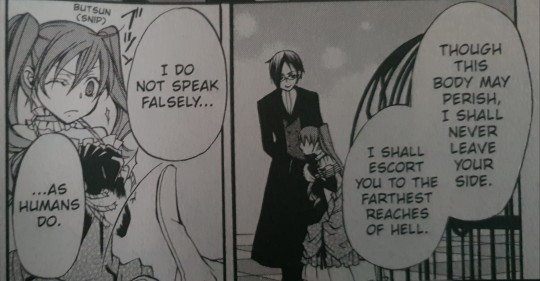
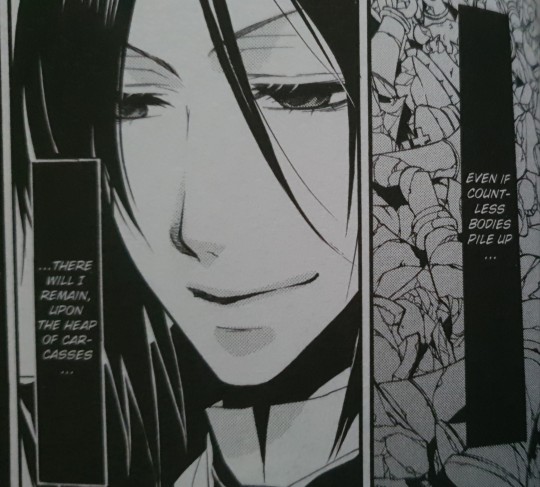

Which suggests that even if he were somehow weakened enough to 'die' whilst bound by the contract and was therefore unable to continue with his ordinary duties, the 'him' that would 'disappear' would be his butler aesthetic form, but he would still be present in some other way (something that expends less energy - a more simple form like an animal or some less coporeal entity - or a case of possession, perhaps?), the liklihood of which is also confirmed by the fact that the contract cannot be terminated by O!Ciel by means of any order, which one would assume to include the order to 'die':
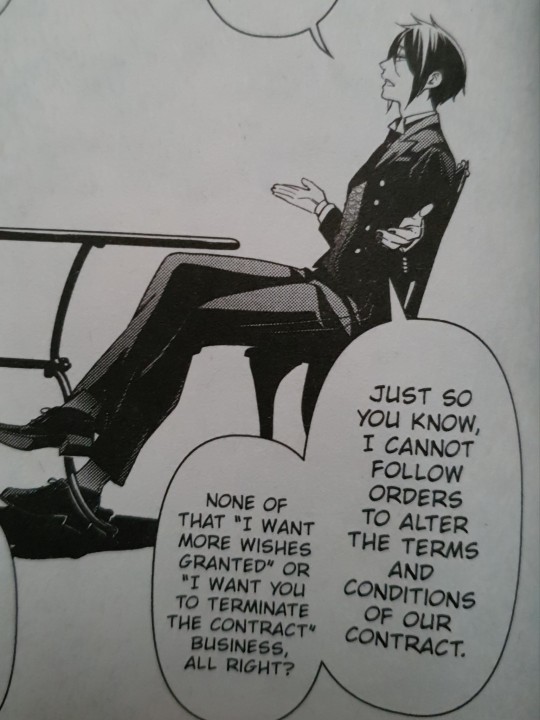
We also have this to go on, from the flashback of the initial contract:
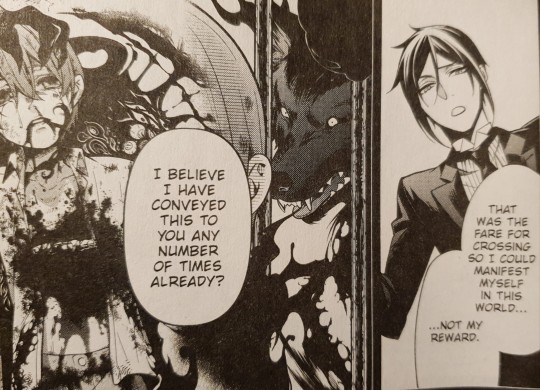
But surely demons must generally able to freely travel from their realm to 'hunt' otherwise they wouldn't pose such an issue to Reapers, so we can now also assume that prior to the story taking place Sebastian didn't have the strength to manage this on his own (probably because of being weak from starving himself), making him essentially 'dead' and gone from our world until otherwise summoned with a suitable sacrifice, providing much needed nourishment in the form of a human soul in order to give the demon strength and boost the recovery process (the necessity of which was also sort of confirmed in the Campania bonus chapter 131.5 - That Butler, Resting - though it was never officially published in english).
Essentially, then, even if Sebastian was killed by the Undertaker's death scythe and harmed in such a way that he absolutely could not continue to take form here and was made to forfeit the contract, he would still exist within his own realm. He may be severely weakened and in need of time to recuperate, or perhaps even put into some dormant state until summoned again, but he would still be 'alive'.
Easy then to see why the concept of such a permanent end would be a fascinating one, especially when made even more absolute with the consuming of the soul, which could otherwise have been considered the one part of a person to 'live on' as it awaits its final judgement.
100 notes
·
View notes
Text
Things people don't talk about enough: the implication that Sebastian invaded Ciel's mind to larp as his twin, featuring the both of them in the outfits they were tortured in, as well as his loved ones in order to prod him about why he made the contract so that he'd snap out of his fugue state.



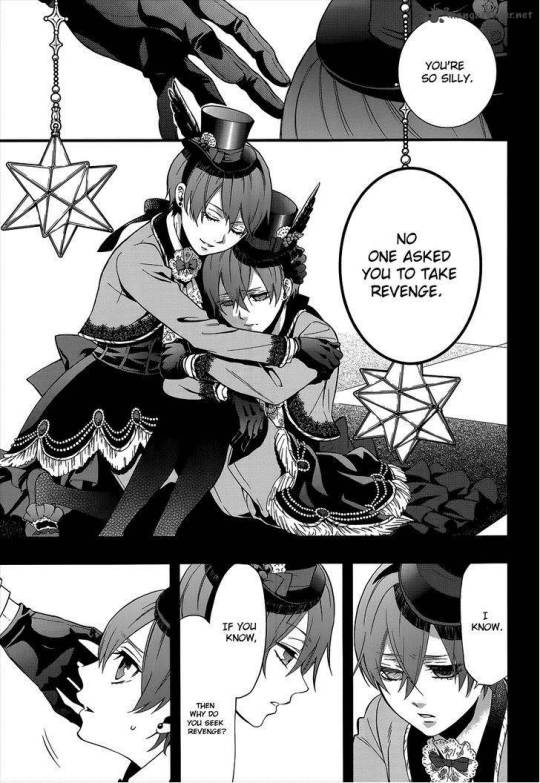
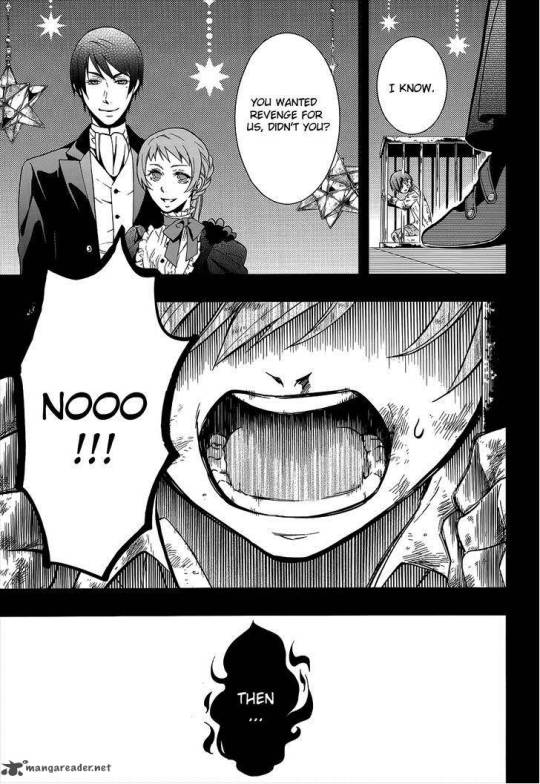
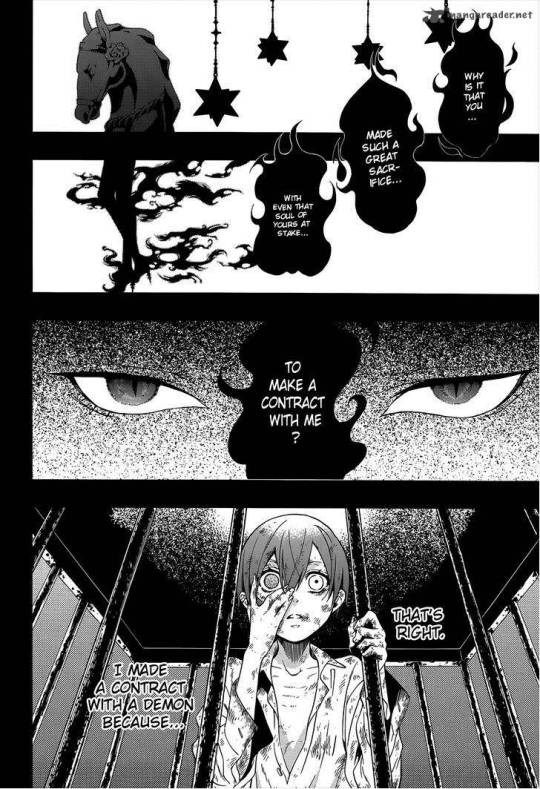
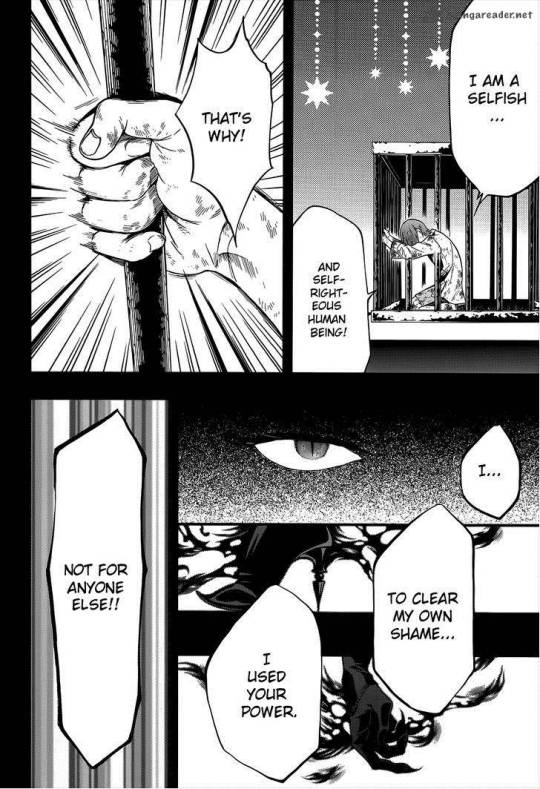
I'm sure there are other interpretations of this moment but the emphasis on the shoes of both r!Ciel and Sebastian (who's entire demonic presence is indicated by his boots) as well as the uninterrupted flow of the line of questioning and tone of speech have sort of solidified this particular take on it for me.
165 notes
·
View notes
Text
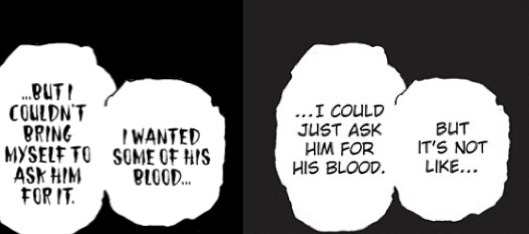
Toga wanted to ask for blood. She wanted to ask Saito for blood.
In fact, outside of battle and missions where anything goes, I think Toga usually does ask before she stabs. She asked Deku for blood in Chapter 348.
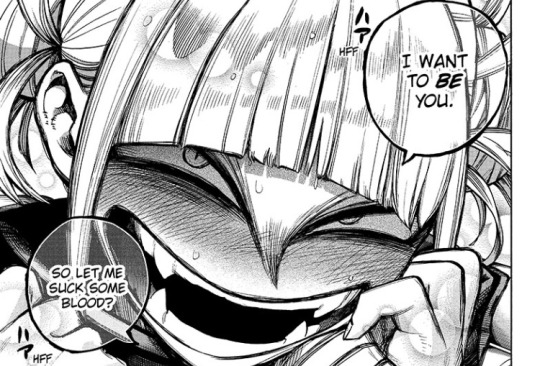
And though this is omake, and I forgot whether this is official or not, she asks here too:

I’ve seen some previous meta that pointed out that all Toga needed was to understand consent (and to eventually find a tolerant group of kinksters). That is indeed a solution, but I think the examples above does show that Toga has at least the basic understanding of consent.
It’s just that the act of asking for it would’ve ostracized her. If she asked, it wouldn’t just be someone random calling her a freak; it would be the person she loves calling her a freak. It’s the ostracism that scared her more than a simple ‘no’.
Her parents hammered it into her head that any manifestation of her desire for blood makes her not human. So she was afraid to ask, and afraid to talk about it, and afraid to seek help or support for it; and it was bottled up inside of her until it exploded.
Not that her stabbing Saitou was okay, obviously. Her logic of ‘well, if I can’t ask, I might as well go for it’ is wonky.
But there’s a reason she functioned so well in the League. She could ask for their blood, and they wouldn’t judge her for it. Maybe they gave it to her, maybe they didn’t. But they never saw her as less.
And that’s what Ochako finally did here. She let Toga explain herself, she listened, she didn’t judge. Ochako even offered her blood— but note that it wasn’t the blood that got Toga to finally stop.
It was Ochako reassuring Toga that she still views Toga as human. And that’s what Toga wanted all along.
1K notes
·
View notes
Text
Which is worse, rape or murder? - Or, should Casca have died during the Eclipse?
Unlike most of my meta posts, this is one I'm making as a direct critique of a specific take I've seen. It's similar to my meta about apostle Casca in that regard, where I want to look at a specific idea and why I dislike it, as opposed to wanting to explore my thoughts on an aspect of canon. To be clear, this is only something I do if I've seen a take a bunch of times, enough so I know it's not a one-off. It's also not something I do because I want to engage in discussion with the people who've said whatever the take is, it's something I do in case other people who agree with me might be interested in a meta post that's more in line with their viewpoint.
I provide this disclaimer because, as I've said a few times now, the idea that it's the better choice to have Casca die during the eclipse is one that I just really dislike, and I make that preeeeetty fuckin clear. I can't control who sees this or who comments, but I did think I should make my stance explicit.
Berserk fandom is an absolute treasure trove of bad takes about rape and sexual assault. Considering the seriousness with which the manga takes rape, despite it's sometimes quite dodgy framing and portrayal, the fact that the fandom is Like That is fully a testament to cishet men's inability to consume media without turning into a brainless amoeba of toxicity.
I have to say, though, what shocked me the most was that this particular take, that Casca should have just died during the eclipse, was not from the dudebro side of fandom ('cause if she had they couldn't make their silly little "casca enjoyed it" jokes).
I'm coming right out of the gate with my opinion, which is a firm no, Casca should not have died during the eclipse, and the story would be weaker if she had. I'm going to presume during this analysis that the people who say this assume that her death would be instead of her rape, as opposed to her being raped and then dying, which would be... Horrific. Even more horrific than canon, lol.
I do have sympathy for some of the people who wish she had died, and in a way I understand, though I vehemently disagree. Some of the posts with this POV sound almost traumatized as they proclaim I wish she would have died, it would have been better. As this is something I've only noticed in the tumblr fandom side of things, where most people are women, I think this comes from women readers feeling furious and sick about one of the most vile rape scenes out there. In some ways its intentionally vile, in others - ie how grotesquely sexualized it is - it's unintentional. Then, of course, she continues to suffer in her disabled, infantilized trauma state. I hear these readers wanting to shout at Miura that he should have just killed her off rather than force her, and us, through reading that. It would have been kinder.
I have... Far less sympathy for others. There's a side of fandom that simply does not care about Casca (in a different way than the dudebros who don't care about her despite gushing about how she's peak tomboy waifu). It's amazing the veneer of progressivism these people put on as they say that Casca should have died, because she did not contribute to the narrative before the eclipse, and she certainly hasn't after. Going to get even spicier for a second and point out fandom's long history of wanting female characters dead because they get in the way of mlm ships, and how I think this is SOMETIMES simply another manifestation of it.
To be fully fucking clear, I do NOT think that being a grffgts shipper (censored so this doesn't show up in the tag LOLLLLL) precludes being shitty about Casca. I think tumblr's demographics, and those demographics' typical shipping preferences, mean that grffgts is naturally going to dominate. By simple statistics, most of the people whose opinions I hate are going to be grffgts shippers. Same with most of the people's opinions I like on tumblr tbh. I do, however, think it's prudent to point out old school fandom misogyny, and how I personally feel it's showing up in the fandom, and also point out that it pisses me off that Casca dying during the eclipse is at all presented as the least misogynistic outcome.
I'm also going to say now that this is firmly being kept in the realm of fiction. In real life, there are horrific discussions about how being a victim of rape defiles you for life, and that it's better to die without the "shame" of being raped than live with it. While I have to be blunt it's difficult for me to separate some of the discussion of Casca dying during the eclipse from that anti-survivor bias I see in real life just because ~we live in a society~, I in general think this sentiment is coming from a place of simply analyzing, narratively, which outcome is less misogynistic given how the rape in canon is portrayed.
Would it narratively have been better for Casca to have died? What about the impact of her death versus her current storyline?
First, I think I need to outline my interpretation of the eclipse rape. I don't think that the decision to have Griffith rape Casca was Miura simply being a misogynistic cishet dude who threw in rape for the hell of it. I also don't think it's OOC. Again, there's much to critique in how it's drawn, but not in the fact that it happened. Griffith, in his moments of feeling out of control and powerless, uses sexual advances to reassert his control over the situation - see Charlotte, or the wagon scene with Casca. A distaste for sexual violence committed by his enemies doesn't mean Griffith is incapable of wielding sexual violence as a weapon himself. In real life, there's a paradox where rape committed by political or social enemies is seen as the worst crime one could ever commit, while the mundane rape committed as a consequence of patriarchy is excusable and the victims should be blamed and shamed. Did Miura have the gender studies acumen to think about that when writing? I dunno, but neither does anyone who thinks he didn't.
I also think it's supposed to establish his actions during the eclipse as fully over the moral event horizon. Without it, it's easy to ask if ultimately, Griffith's decision to sacrifice his followers to a cruel death is justified to create a perfect utopia. With it, it establishes Griffith as acting fully on cruel, malicious impulse in moments of emotional turmoil, which puts his future utopia in jeopardy. I can't be the only one who sees Falconia as a ticking time bomb. Of course, this doesn't mean he needed to rape Casca, but simply that I think it was necessary to his character to do something that crossed that moral line. He could have raped Guts I suppose. Killerbambi has entered the chat.
While I think this might sound strange, I actually think it's immensely validating to have a character who is a victim not just of rape, but of rape committed by someone she already knew. That's genuinely unique in media on the whole, which plays into that paradox I mentioned earlier - in real life, the vast majority of assaults are committed by someone the victim knew. Having the story surround the continual, horrific trauma of betrayal, of having to watch the person who hurt you move on while trauma keeps you in horrible stasis is almost so realistic it's... uncomfortable. Painful. Hard to read.
There's no greater purpose to what happened to Casca. She didn't grow from it, instead she regressed.
Her general lack of agency post-eclipse is much critiqued in the fandom and like. Fucking yeah fair LOLLLLLL BUT ALSO... But also. Fandom on the whole can be so cruel about traumatized female characters, like there's no way they can do trauma "right." In Casca's case, her lack of agency is turned into a reason she should simply have been killed off instead, as though there aren't so many survivors who, while not as literally as she does, retreat into a shell of themselves and are frozen with trauma as the world begins to pass them by. Of course, the critique would be that she's not a real person, she's a female character written in a misogynistic way by a man, but I personally think this overstates Miura's issues with his portrayal of rape. To me, it presents what they think are his biases as justification for their own biases.
Time and time again, I see survivors discuss feeling validated by Casca's trauma response after being assaulted. Even the parts of the rape scene that I vehemently dislike, such as the hyper-focus on Casca's body and the physical reactions she's having, I've seen more than one person say they felt validated because they too had an unwanted arousal response during an assault. I'll still critique the scene, but regardless of if this was Miura's intention, its impact is clear.
I'll again plug this article by Jackson P. Brown, How Berserk’s Casca challenges the myth of the “Strong Black Woman.” Just to show a quote from it:

All of the action of the story after Conviction Arc is in service of restoring Casca's mind. During Conviction Arc and after, Casca has groups of women who love and protect her, with women as her source of safety. Guts is single mindedly focused on bringing her back, putting his body on the line again and again to protect her and restore her. I wondered about including Guts here because I'm sure I'll get some anon about the Beast of Darkness, which again fair LOL. I have complicated feelings on that, but mostly I think the importance the narrative puts on her mind and her protection is touching, and I think this outweighs how the negative things apparently mean that she should have died.
Her story and trauma, despite its flaws, is shockingly realistic and validating to so many people. She's also a key narrative component post-eclipse, and not just ~for Guts' manpain~ or as a helpless plot device, her story is her own. I've written about Elaine as a character and what she represents, but in brief, Casca doesn't disappear after the eclipse. Miura wrote Elaine with these moments where Casca comes to the surface, and while I wish we had more of her POV I think you can look at how she's coping from how Elaine reacts to the world around her.
I also think it's necessary to have Casca at the Hill of Swords. There's Guts, who Griffith torments in the way only a bitter ex can, and Rickert, who doesn't know what happened the day of the eclipse, but I think Casca is the key component in that scene that cuts through all of Griffith's posturing and Guts' anger. She is there, making the real, human cost of what Griffith did during the eclipse unignorable in a way that no other character could. It's one thing for Guts to be furious with him and Rickert ignorant, it's another to have someone who loved him so innocently and dearly trembling just at the sight of him. Let's not pretend that the depth of betrayal in this scene would be the same if you swapped her for, say, Judeau.
It's funny, Miura is quoted as saying that his initial reason for keeping Casca alive was to provide Guts an ever-burning flame of vengeance, an eternal reminder of everything that he lost during the eclipse. What's wound up happening, on a meta level, is that Casca provides the reader a constant reminder of what happened during the eclipse. As more and more focus is given to her PTSD with her revival, the cruelty with which Griffith acted (and continues to act) becomes harder and harder to ignore. It becomes more difficult to push it aside as just bad, misogynistic writing.
And also, quite simply, I like narratives about trauma recovery, and therefore I'll always find Casca's story worth telling despite my frustration with a lot of it. It's absolutely wild to me that for how often I see the fandom complain about her being "fridged" they think it would have been better to see her ACTUALLY fridged, no chance of coming back at all, just dead to fuel Guts' revenge arc. Would it really be better to have her be just another dead girlfriend? Really?
That's really what it comes down to. I like Casca as a character, and I want her to have lived. The people who wish she had died, many of them simply don't like her as a character. Not all, particularly in that first group I mentioned at the start, but many. Everyone has their preferences of course, but I don't think I need to respect when someone thinks a character has so little influence on the narrative that they should have just died, especially if that character is Casca.
If Casca had died during the eclipse, it would not have been a good death. It would not have been brave, or triumphant, or worth anything for her as a character. Judeau died to protect Casca, but even his death was not brave, it was just sad. That's the whole point of the eclipse.
To have Casca die that way would be a disservice to her as a character, far moreso than to have her struggle on as a traumatized victim of sexual violence. That's genuinely what I believe.
134 notes
·
View notes
Text
I actually find it funny when people will say the heroes need to kill more villains instead of arresting them when, from where I'm looking, every instance of the heroes killing a villain(s) has led to some consequence that would've been avoided had they just been taken in alive. (Which evidence has often shown them quite capable of doing.)
Lady Nagant was made to kill loads of people, driving her crazy and leading her to kill her boss and deprive the hero side of one of it's best.
Her case feels like a big reason why killing on the regular would be incompatible with the rest of the hero shtick; 'cause it turns out people with lots of blood on their hands have trouble using them to then shake the hands of children.
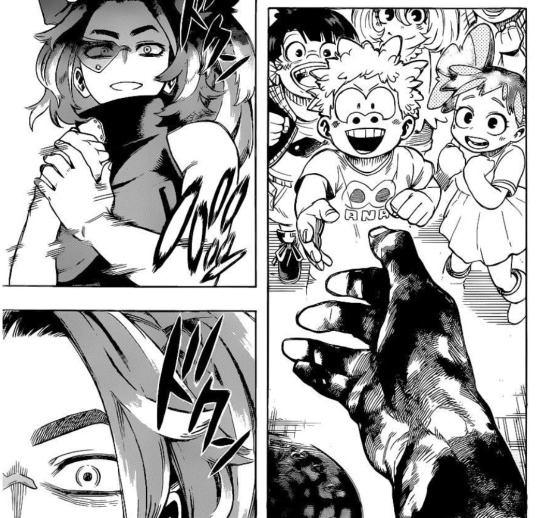
People say All Might should've killed AFO; but you can tell both from All Might's dialogue in Kamino & from how AFO regrew his head that that's exactly how their first fight ~7 years ago ended. AFO's brains met the pavement that day. And I can only assume this allowed his body to be easily recovered & revived, letting him lay low for the next 6 years to mould Tomura into a successor and orchestrate a good portion of the conflicts we've seen in this series.
Just saying, that sounds much harder to do from Tartarus. And at least the heroes knew when he broke out of jail way faster then when he broke out of the grip of death. Heck, it could easily be argued he only broke out of jail thanks to that 6 years of set-up.
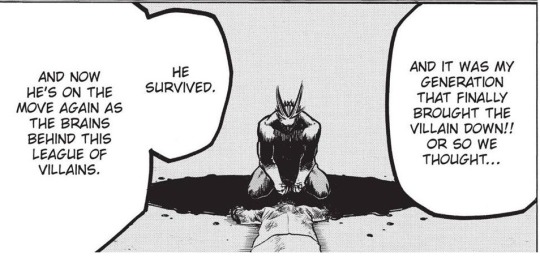
Oh and where to start with Hawks killing Twice? Maybe how it enraged Toga & Dabi to make them more crazy & dangerous, maybe how it affected people's trust in heroes? Oh but the big one has to be how leaving Twice as a corpse let his blood be collected for Toga to get a parade off anyway; one the heroes were unprepared for too, which distracted a lot of the pros meant to keep AFO in Gunga.
All of which could've been avoided if Hawks had just taken Twice in alive. (Which I must reiterate he easily could have done; I mean his quirk was shown pretty easily countering a Parade.) The heroes wouldn't have had to deal with a Parade in this war at all if Twice was sitting pretty in a jail cell next to Compress & Geten.
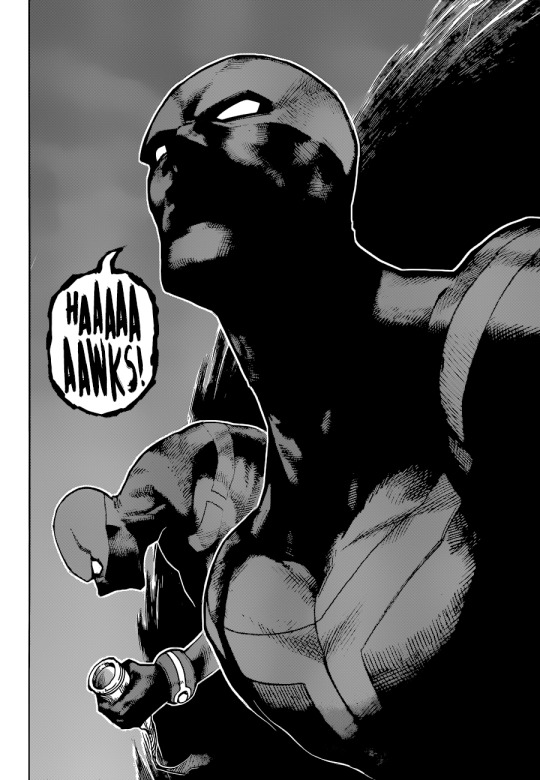
I can't help but think those last two cases could be a surprisingly common occurrence too if heroes killed as much as some readers say they should. Like, could you imagine if every dangerous villain in Japan's history was killed and then just dumped somewhere for a guy like Dr. Garaki to get his hands on them the same way he got Shirakumo?
So anyway, between the mental health issues it causes, combined with how villains keep finding ways to perform necromancy; I'm just not seeing a lot of evidence that things go well for the heroes when they kill villains, or that they'd go much better if the heroes were kill-happy soldiers of the war on villainy all the time.
323 notes
·
View notes
Text
Just to be clear, the whole "Deku and Bakugo holding hands by the end of the manga" thing isn't like. Something weird or made up, or even indicative of shipping. It's literally just the culmination of their interactions considering the way Horikoshi centralized "reaching to/for" as being foundational to Bakugo and Midoriya's relationship. Almost all of their big moments can be described as the act of one reaching for the other, both physically and emotionally—and both matter.
The whole reacher/reachee dynamic starts (chronologically for them) at about four, and this one interaction defines the entirety of their relationship going forward.
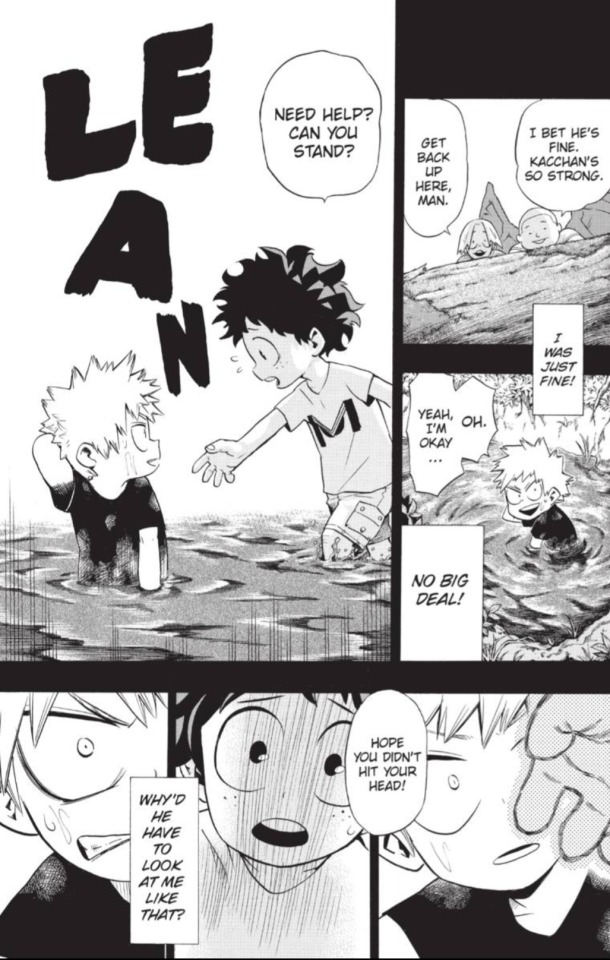
Notice how Midoriya reaches, and Bakugo shoves him off. He clearly recognizes the gesture, but he absolutely refuses to respond in kind. This is the break in their relationship, the symbolic moment where Bakugo pulls away and Midoriya is left trailing behind after him.
It isn't until years later that Midoriya reaches out to Bakugo again, under similar, but much more dangerous circumstances. One thing hasn't changed; Midoriya is the one originally doing the reaching. What does change is that Bakugo, unlike when they were kids, reaches back:

I think a lot of people pass over Bakugo's response here as unimportant because you have to translate it through seven asshole filters to realize he's roundaboutly trying to thank Midoriya for saving his life, but it's relevant in that it sets the tone going forward. This moment shows that Bakugo is willing to reach back—not necessarily kindly, and certainly not physically, not yet—if Midoriya reaches first. It's the first sign that Bakugo does actually want a reciprocal relationship, even if he can't verbalize or actualize it yet.
We see this extended after Deku vs. Kacchan 1. Midoriya reaches out to Bakugo, chasing him down to do so. While he doesn't reach out physically so much, he emotionally reaches out by (vaguely) offering Bakugo information about OfA.
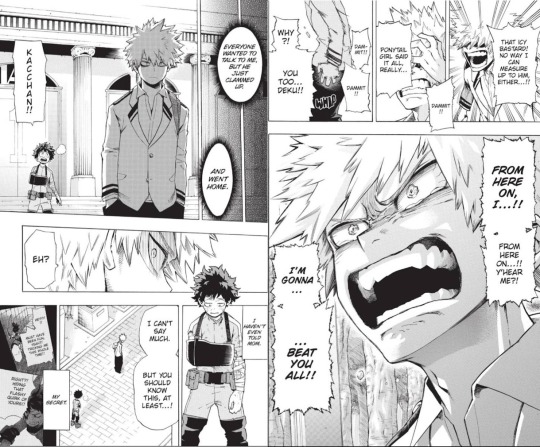
While Bakugo isn't nice about it, once Midoriya has shown his vulnerability, Bakugo responds in kind, emotionally reaching back to Midoriya. He doesn't leave Midoriya hanging, instead going the extra mile and, unprompted, exposing his own vulnerabilties. This is more movement towards a reciprocal relationship—if Midoriya opens up, Bakugo will follow suit, even if he still won't go first.
It takes their final exam for Bakugo to physically reach back. After Midoriya "reaches" (read: punches, but look at the posing, and how his arm is outstretched) Bakugo does the same. They manage it because it's hidden under the guise of training and teamwork, more violent than anything.
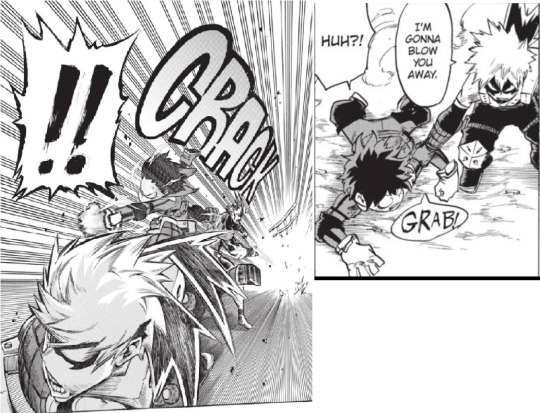
This sequence isn't just physical, though; Midoriya reaches out to Bakugo and reaches through his defenses emotionally in a way that actually affects him. Here, for the first time, Bakugo feels like he's being acknowledged. Seen. Midoriya's right, Bakugo doesn't just give up and neither does Midoriya, and if they understand that about each other, maybe they can manage to understand more. To be more than just estranged ex-childhood friends and rivals. So Bakugo reaches for Midoriya and shows him that he can and will reciprocate, so long as they're doing it on his terms.
It's after this, after Bakugo has realized he maybe can reach back when Midoriya holds out his hand and it won't be terrible, that they're thwarted by the plot. For the first time, Midoriya is prevented from reaching out, physically, and instead does so verbally, and Bakugo, who is also unable to physically reach out, verbally reaches back. Call and response. A pantomime of what they want, and intentionally unsatisfying.
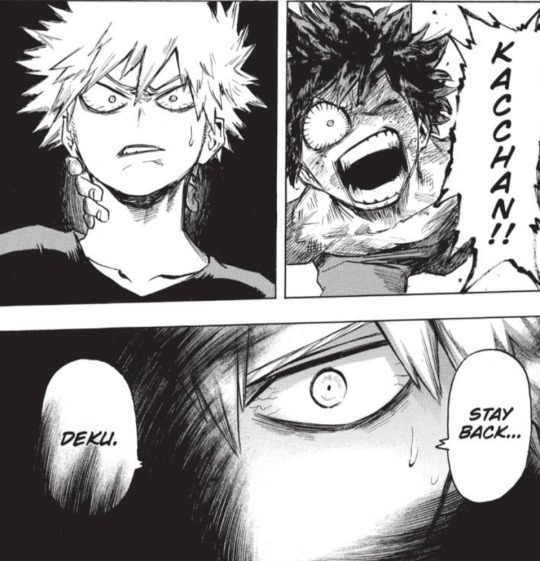
This is contrasted boldly and meaningfully against Kirishima physically being able to reach for Bakugo, who takes his hand without thought.
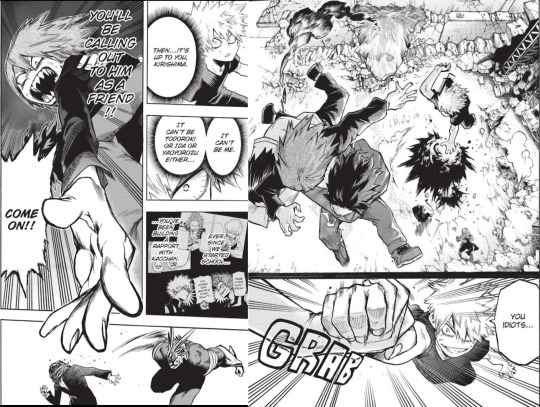
You'll notice this is mostly a physical act, not an emotional one. Sure, they're both happy to see each other and both their emotions are running high, but this moment isn't meant to be vulnerable and charged the same way Bakugo and Midoriya's reaching out is, because Kirishima and Bakugo have an uncomplicated relationship, while Midoriya and Bakugo do not. This moment is supposed to show Bakugo's individual, personal growth (in that he can even have a reciprocal, uncomplicated relationship built on respect and kindness with another person), but Kirishima's reaching out to him is largely utilitarian and being used within a larger contextual frame. It cannot exist alone because of how motifs function within works as a whole. This moment exists to bring attention to the act of reaching out mutually, and why it matters so much that Bakugo and Midoriya have yet to achieve it.
Having established that they both are actively thinking about this aspect of their relationship, it's only after Bakugo and Midoriya's near miss that things change again. Not entirely—while Bakugo instigates Deku vs. Kacchan 2, he doesn't really reach first. He's still too defensive, still too distrusting of Midoriya's intentions. He instead goes in on the offense, exposing Midoriya by bringing up OfA and forcing Midoriya's hand.
It's only when Midoriya reaches out, both physically and emotionally, that Bakugo breaks and reaches back.
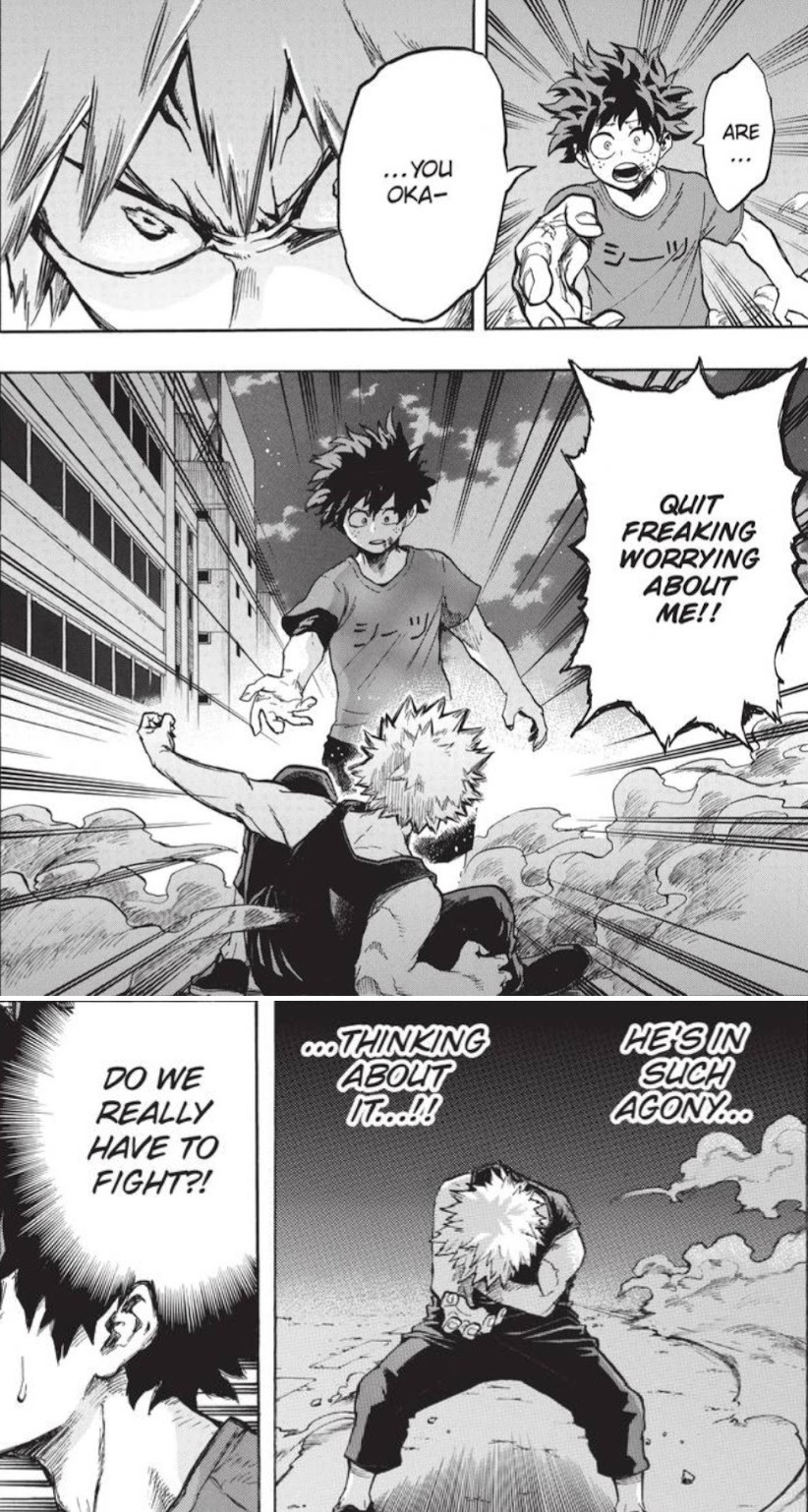
Look at the posing and the positioning of the characters within these panels. Bakugo isn't drawn like this for shits and giggles, he's intentionally shown to be holding his hand out to Midoriya. Their whole fight has been characterized by Bakugo asking Midoriya for things (information about his quirk, the fight itself, why did All Might choose him as successor), and this is one more time. He is asking Midoriya to keep reaching out—to let Bakugo reach back, despite his ongoing rejections. To be there with and for Bakugo as he works through his own issues and to not let go. To let him be weak until he can work up the strength to fully reach back, and even reach first.
Which he wants to do. Desperately.
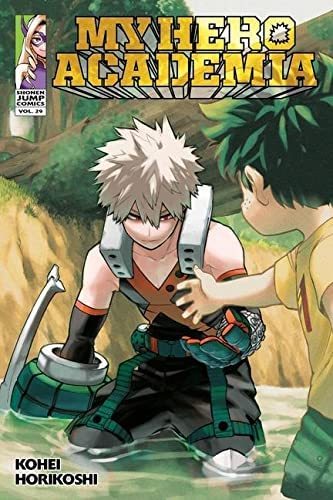
And when he does...
Bakugo reaches out first in his apology. Emotionally, not physically. Possibly because Bakugo actually tends to be pretty prickly about physical touch, and seems to treat that as more intimate than many of his peers, but I think his choice to reach out emotionally more has to do with Bakugo making the decision to do the difficult thing, to give Midoriya what he deserves. Because reaching out physically is just moving your hand—baring your soul? That shit hurts. That's hard. But it's what Midoriya needs, and it's what Bakugo wants to give.
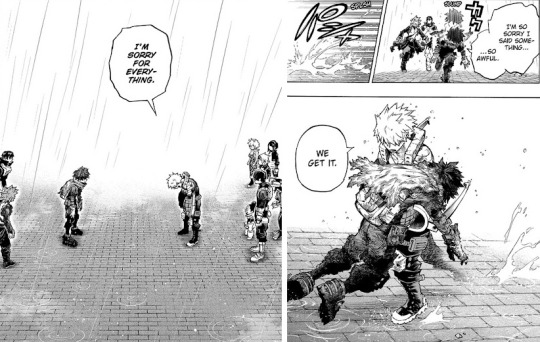
And now it's Midoriya's turn to reach back. Not emotionally, but physically, stumbling his way to Bakugo. There is no emotional reciprocation on Midoriya's part this time—Bakugo will need to reach out again, later.
It isn't until the very end that Bakugo reaches—physically—first. And for the first time, Midoriya's not there.
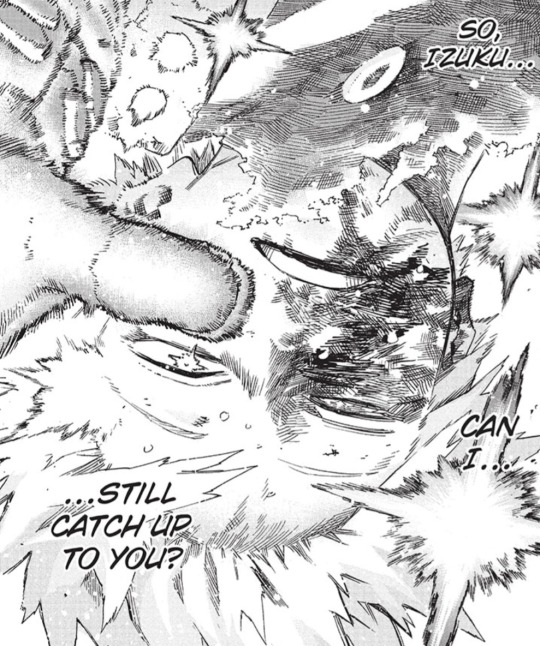
The whole point of their relationship, the moment this all suggests they are heading to, is the two of them reaching for each other and being able to connect. Physically and emotionally. That is the entire purpose of this constant back and forth, one reaching out in the hopes that the other will reach back. So far they haven't completely managed, but for the arc of their relationship to be complete, that has to happen.
I understand why this often gets put under a romantic lens, and while it can be, I guess, the motif itself and the arc of their relationship exists regardless of any reader's personal preferances. That's what writing conventions are for, so we can recognize and predict the outcome of the story as intended by the author. The act of reaching out isn't exclusive to Bakugo and Midoriya within the story by any means, but their relationship being defined by the act and symbolized by it, continuously depicted with it as the main focus, is certainly not an accident. It is the culmination, and the ultimate end goal of their relationship, which—again, if writing conventions are followed—should be met. Like I understand that people get told "there's no correct answers in media analysis" but baby, sometimes there are answers with enough supporting evidence that suggesting they're wrong is... I don't even know.
707 notes
·
View notes
Text
I was rereading the forest arc for togachako and the Aizawa and Dabi interaction made me pause. I’ve always thought of it as an odd matchup given that there’s seemingly no follow up, even though it comes across as a fight that would have one.
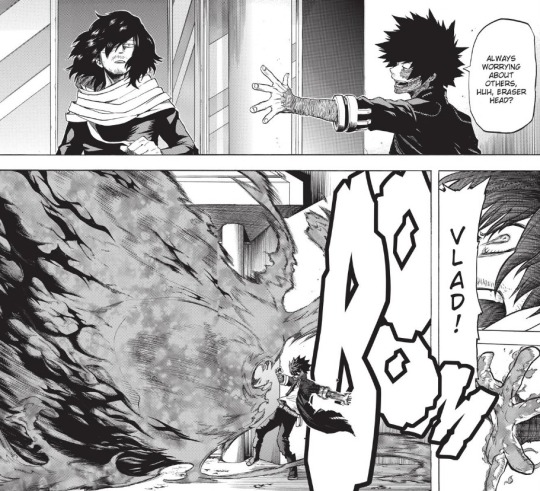
Dabi is a character that always gives off an air of “I know more than you”, and he likes to dangle it over people’s heads. He’s willing to wait for a long time to reveal things right at the perfect time. So, he’s a good character for this moment. His choice of words is vague and it gives off the sense that something is building. It likely was, for the traitor Aoyama reveal, but we know that plot point was moved around.

At the same time, Dabi’s taunts here are personal. Way too personal.
So, I have a feeling that it’s due to the fact that Aizawa’s backstory was becoming more concrete around this time, in conjunction with Mic’s (as they were already said to be in the same class early on) and the Aoyama reveal.
Just about ten chapters earlier, Todoroki and Yaoyorozu were paired up to fight Aizawa in the practical exams, and the focus was on Momo, who struggled with overthinking and self doubt. Aizawa calls her out on this and pushes the both of them to have confidence in her[self], and work as a proper team. The students/teacher matchups are done purposefully, and we know that Aizawa once struggled with the exact same issue as she is here.
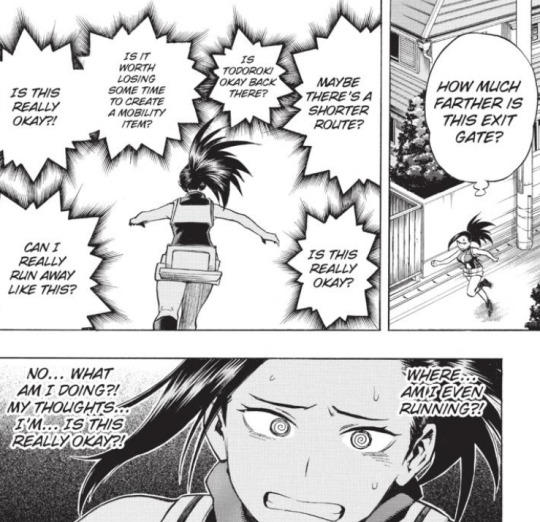
A bit of a leap, but the Wild Wild Pussycats also shared a similar foreshadow-y dynamic with the three idiots, where Ragdoll, Shiretoko, the one who created the idea of the team, barely dodged being turned into a Nomu. This is the most solid estimate I could make for Aizawa’s backstory becoming fully concrete, including a deceased friend.
However, it’s clear that Horikoshi didn’t know where to place his backstory after moving back the traitor reveal, and instead later took advantage of the pre-canon spin-off to put it in, which ended up working out as the backstory ended up becoming rather long when fleshed out.
#mha#shouta aizawa#dabi#momo yaoyorozu#have I mentioned that I really love Momo’s exam? it’s one of my favorite parts of the entire series#wait I just remembered i have a momo pfp so that shouldn’t come as a surprise
26 notes
·
View notes